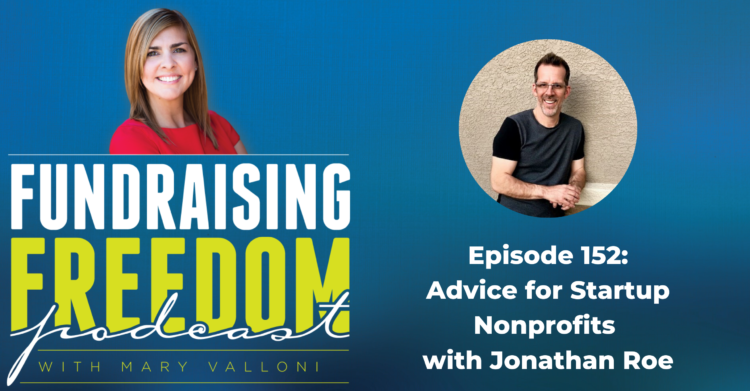Podcast: Play in new window | Download
Subscribe: Apple Podcasts | Android | RSS
Dr. Jonathan Roe has been a non-profit coach and trainer in AZ for more than a decade and is the Founder and CEO of Venture 1:9. Venture 1:9 guides non-profits to a place of courage, health, sustainability and impact, through free training, coaching and granting. After graduating college in Boston, Jonathan spent 17 years in church leadership, pastoring two local churches near Washington, D.C. and Columbus, Ohio. In early 2008, he moved to Phoenix to begin work serving and strengthening Christian non-profit organizations. Jonathan also serves as an Adjunct Professor for Johnson University (Tennessee/Florida) and Point University (Alabama/Georgia), teaches at the CCV Church Leadership Institute, and is a coach and mentor to various community leaders.
How did you get into fundraising and why are you so passionate about it?
One of the reasons I’m so passionate about fundraising is you’re raising up people as well as generating resources; to be connected in a meaningful way with your work. And it’s not just the financial resources. I work with groups all the time who believe their number one need is a whole bunch of money right now. When I dig in, oftentimes I see that they aren’t even ready for a whole bunch of money right now. You need dollars to obtain resources, but you need a bunch of great people with you as well. Not just high dollar donors, but high-level volunteers who are connected with the work. To me, fundraising helps to make all of that happen.
What are you seeing that’s actually working where people/organizations are able to create sustainability?
If nonprofits want to be around for the long-haul, they have to have various streams of healthy income. If a nonprofit is running its entire operation off of five families that are providing major gifts, while great, it puts the organization on thin ice. Or, organizations that are primarily funded by grants – it’s great that they can get those grants, but those [grants] are just a little economic shift from going away. Focus on the raising up of people. If you have people who are connected with your work, they are going to help drive your organization forward as well.
Why do you see faith-based organizations trying to go it alone?
I think a lot of it comes down to how much do you, as a nonprofit leader, really believe in the work you’re doing. Not just to change the lives of the people you’re serving, but also the way it will change the lives of the people who are connected with the work. I see this in fundraising also where I’ll attend an event and the organization will spend 75 minutes talking about all the incredible things that are happening. And then there’s this really interesting dynamic, where when they get to the end of all that and it comes time to ask people to commit financial resources to it, they all of a sudden begin to apologize for asking for people to give. I don’t understand that because your work is so incredible, why are you not shouting from the mountain top about the incredible opportunity for others to get involved and drive this work forward? Looking at our work and fundraising as transactional is the exact opposite of what it should be. Especially when you look at it from a biblical perspective. It should be about what we can do together and how we are going to be changed together.
For those who are just getting started in their fundraising, what advice would you give?
When groups come to me for help, there are two things I say right away. First, I have them tell me what they are going to do – 20 minutes later they cannot explain their work to me. Startup organizations need to be straight on the message – who you are, what you’re doing, what you’re not going to do, how resources are going to be spent, and what’s going to happen over the next 12-24 months. 9 out of 10 nonprofits I work with do NOT have their messaging figured out. You have to be able to articulate what your work is and why you’re doing it. Second, set goals connecting the donors rather than dollars. What I mean by that is, that a lot of organizations think they have to go raise their money as quickly as they can. But when you only set goals connecting with dollars, the danger is when you hit that goal, you think you’re done. However, instead of focusing on raising $50,000 for example, focus on raising up your next 50 people. Maybe 5 of those are going to be major gift donors, 10 are going to be monthly partners, 5 might be foundations and so on. As you work through this exercise, you’re essentially working through your fundraising strategy.
What does fundraising freedom mean to you?
You are not going to experience fundraising freedom when you are a slave to the bottom line. Sometimes nonprofits get so focused on the dollar amount that needs to be raised, and don’t get me wrong, we need money to get resources, but when that’s the focus then if they aren’t bottom-lining money quickly enough, they start to get desperate. The flip side of that is to understand that you’re raising money to do great work. You must seek to understand your givers and partners so that you’re having the right conversations and providing them with opportunities at the right time for them.
Connect with Jonathan:
Connect with Mary:


Thank you for this podcast! I’m learning so much from these channel